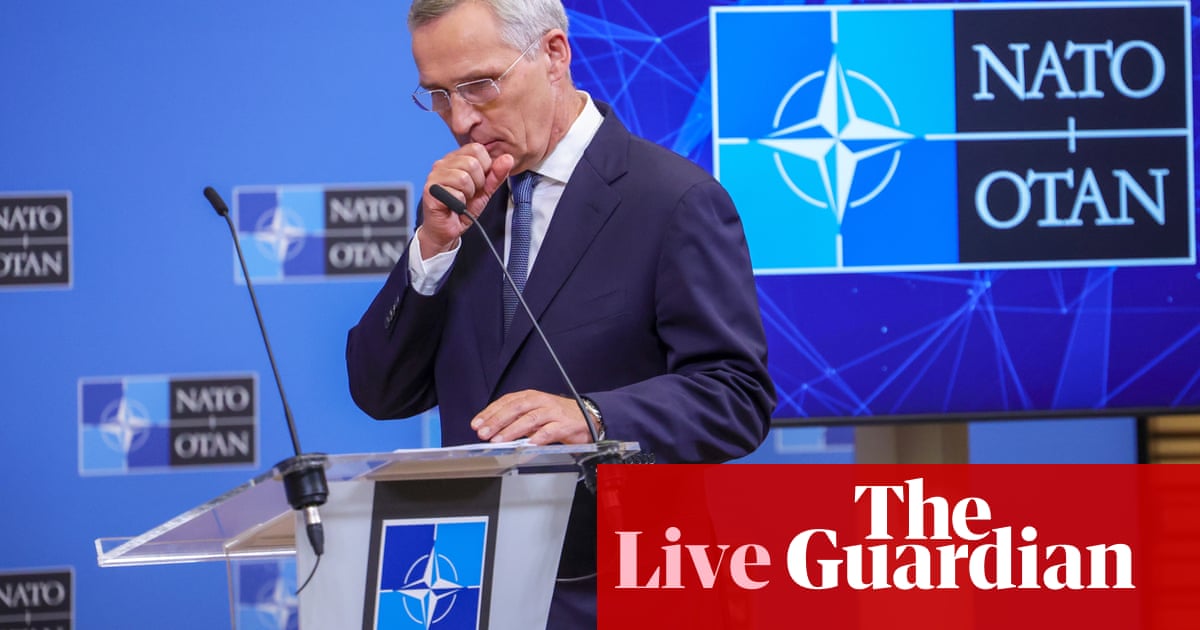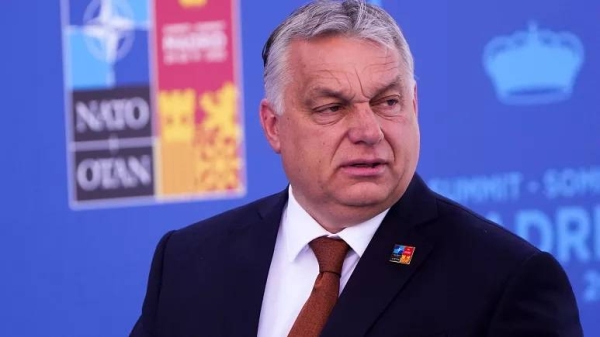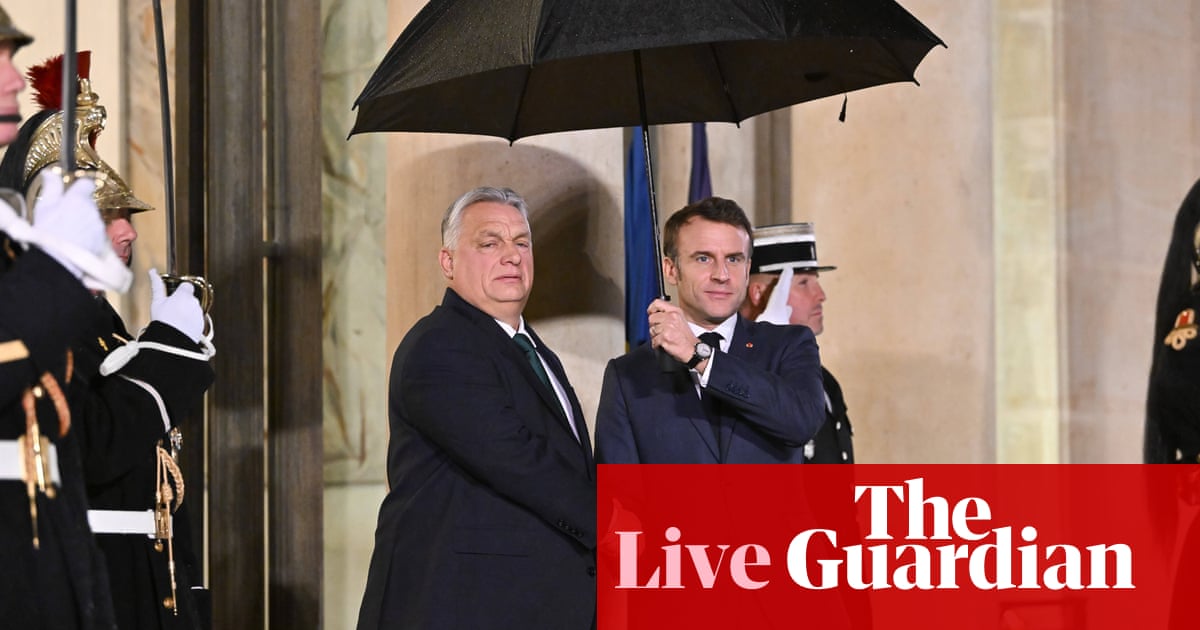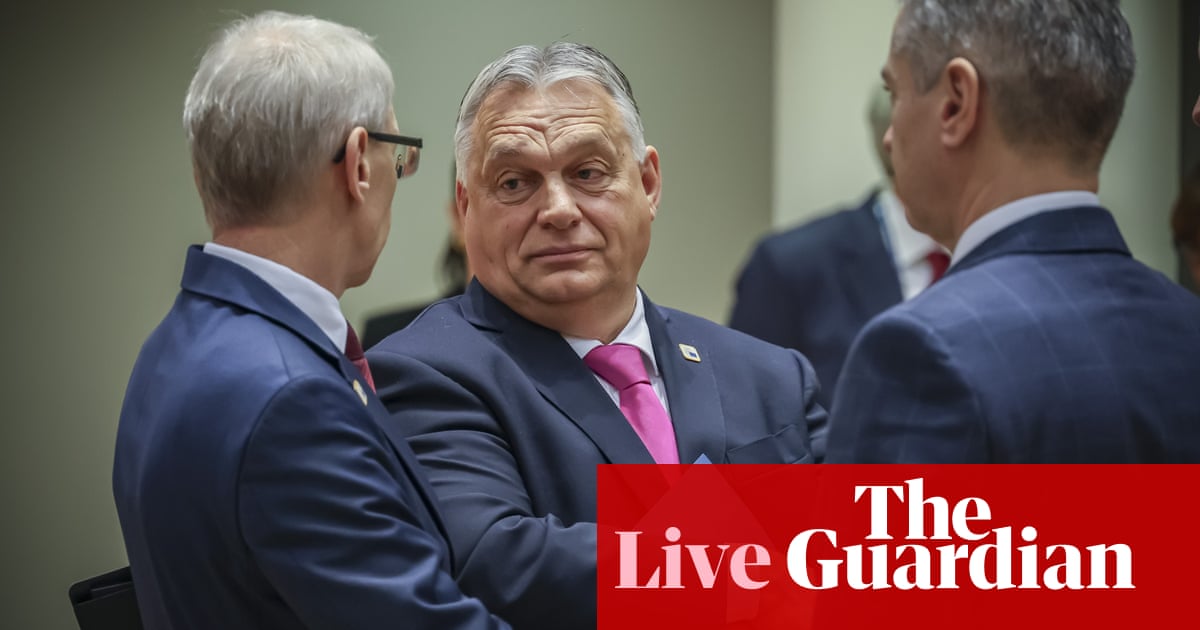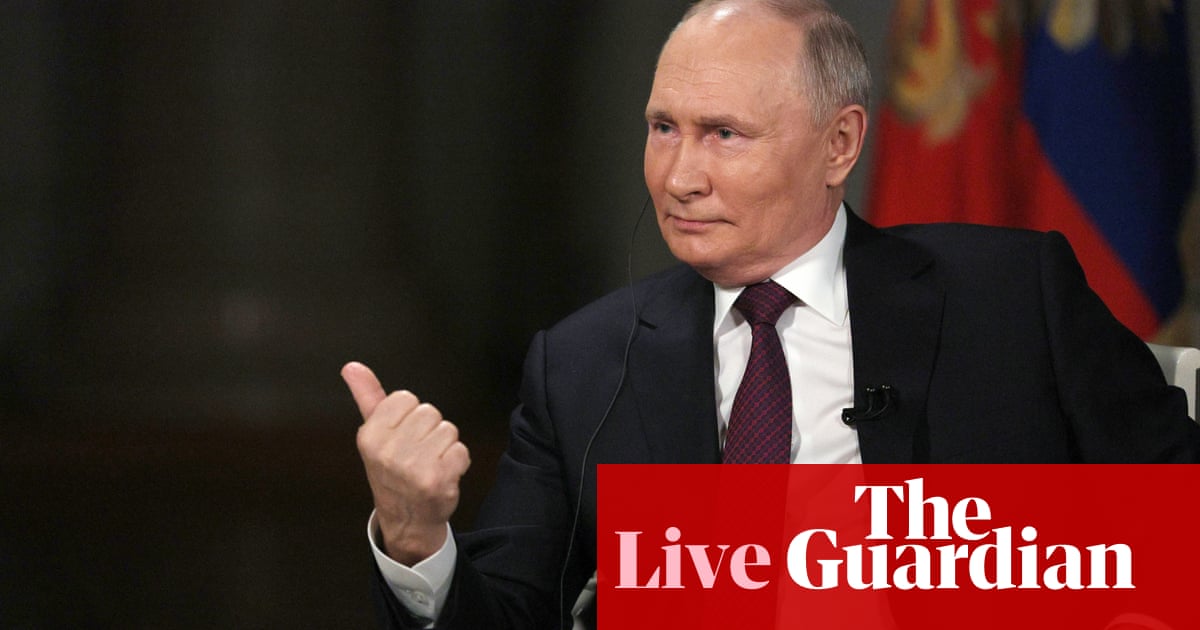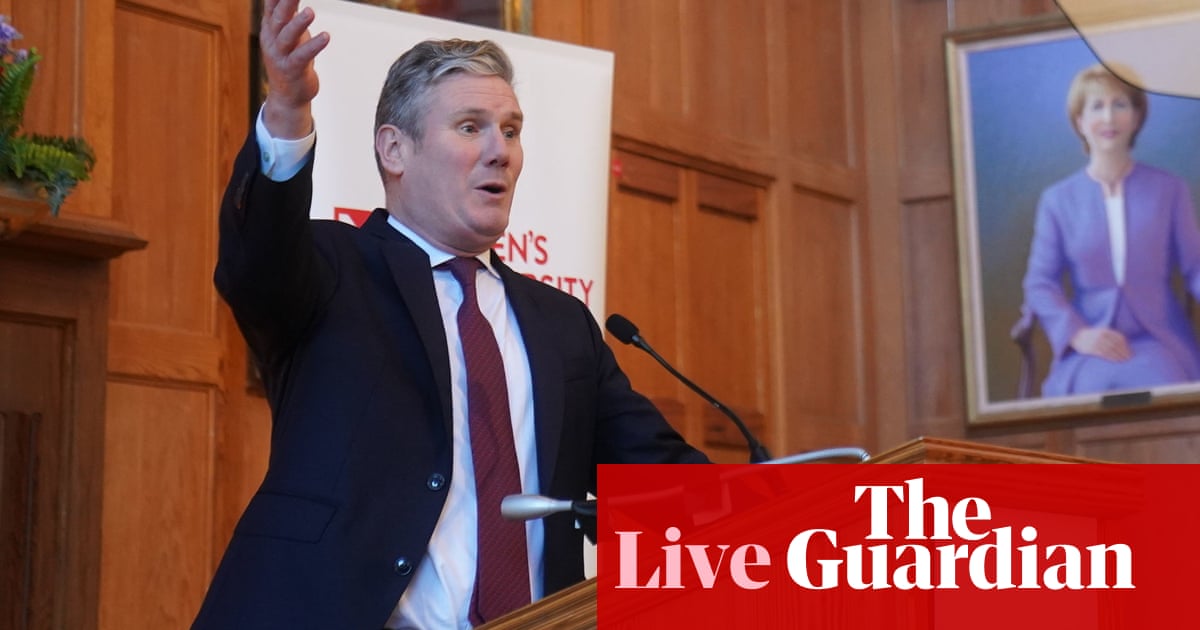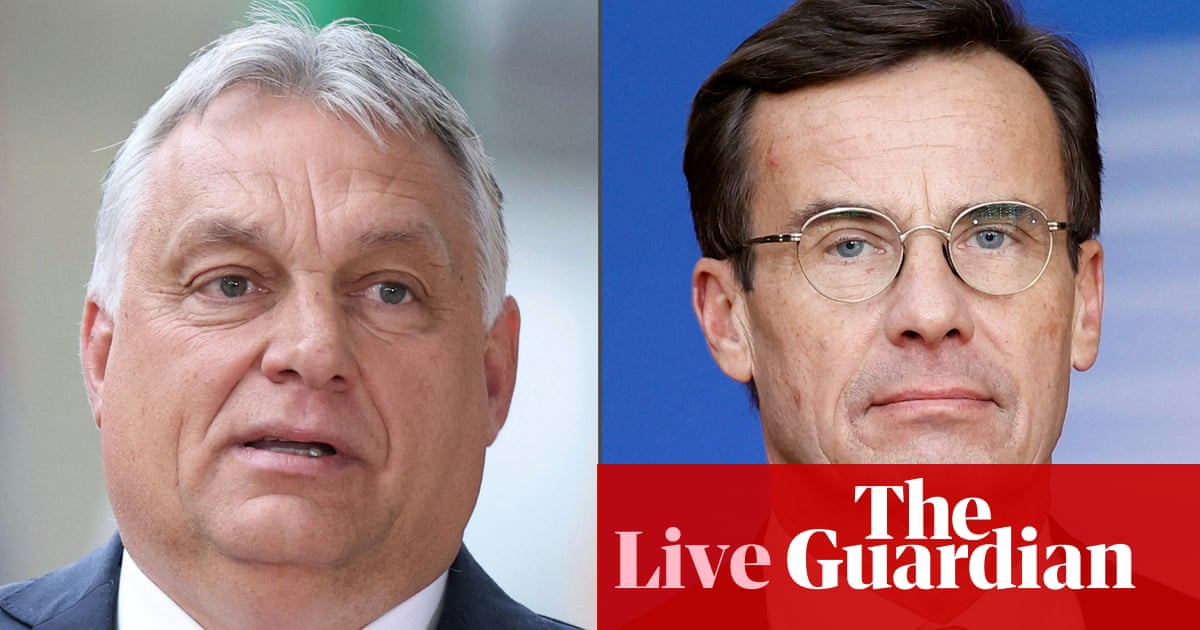
Swedish prime minister agrees to meet Orbán as Hungary holds up Nato bid
Sweden’s prime minister, Ulf Kristersson, has accepted the Hungarian prime minister, Viktor Orbán’s, proposal to hold talks.
Hungary’s parliament has yet to ratify Sweden’s Nato membership, fuelling frustration across the alliance as Budapest had repeatedly pledged not be the last to sign off.
Earlier in the week, Orbán wrote to his Swedish counterpart suggesting a meeting.
In a letter published by Sweden’s SVT today, Kristersson wrote:
I agree with you that a more intensive political dialogue between our countries would be beneficial. There are, as you mention, several issues of common interest – bilaterally, with our cooperation on the Gripen fighter aircraft; in the EU, in view of your upcoming presidency; and of course, within Nato, as allies.
The completion of the ratification process of Sweden’s Nato membership in the Hungarian parliament will create a solid foundation to move ahead in our bilateral relationship, and to reinforce mutual understanding and trust.
Orbán had said yesterday that he would urge Hungary’s parliament to vote in favour of Sweden’s membership. Today, however, the speaker of Hungary’s parliament, László Kövér, said there was no urgency on the matter.
In an interview with pro-government news portal Index, the speaker accused Sweden of treating Hungary with “arrogance and negligence.”
Asked what Sweden should do, Kövér said that “for example, it would be worthwhile to take each other seriously”.
The speaker indicated that he currently did not support Swedish accession but added that he would be “happy” if Sweden “would as soon as possible give me the chance to change my position in good conscience”.
Orbán dominates his ruling Fidesz party and MPs carefully follow his instructions – leading many western allies to question the sincerity of Hungarian government claims that delays were beyond their control.
Summary of the day
Sweden’s prime minister, Ulf Kristersson, has accepted a proposal made by the Hungarian prime minister, Viktor Orbán, to hold talks amid frustrations that Hungary’s parliament has yet to ratify Swedish Nato accession.
While Orbán yesterday reiterated that he would urge parliament to vote, his close political ally, László Kövér, who is the parliament’s speaker, said today there was no urgency on the matter.
Kövér accused Sweden of treating Hungary with “arrogance and negligence”.
Ursula von der Leyen, the European Commission’s president, said there was a “sense of urgency” that things had to improve for Europe’s agriculture sector.
Citing “polarisation”, the commission chief said that discussions now aim “to find a new consensus on issues which we all struggle with”.
Peter Strohschneider, the chair of the strategic dialogue on the future of agriculture group, said populist battles are not the way to resolve the conflicts between farmers and environmental policy.
Farmers in France continued protesting and blocking roads in different parts of the country.
France’s prime minister, Gabriel Attal, is expected to make proposals tomorrow aimed at addressing farmers’ grievances.
But in the meantime, protests are expected to continue. Here are more photos from today.
Two agriculture union chapters have called for a “blockade of Paris” tomorrow, Le Monde reports. They have asked their members to gather on main roads around the capital.
Professor leading EU agriculture dialogue calls for moving away from earlier battles
Populist battles are not the way to resolve the conflicts between farmers and environmental policy, the chair of the strategic dialogue on the future of agriculture group said today at the opening of the first meeting in Brussels.
Peter Strohschneider told the meeting of farmers groups and academics that they had a responsibility to drive their arguments through facts and evidence and “withstand the tensions arising from this”.
The German professor lamented what he described as “a sort of death semantics that dominates public discourse” around climate change and agriculture.
“The members [of the dialogue] are not only subject to the obligation to provide factual justification for your statements but also to justify them in terms of organisational policies.”
If the dialogue was to have a chance of success, interest groups must “break away from the traditions of previous battles”, he said.
The dialogue group was set up following the EU Commission chief Ursula von der Leyen’s annual address last September amid fears that rightwing parties were exploiting fears in the farming community to make political gains in the EU parliamentary elections.
Here are more images from France today, as farmers continue their protests.
The Dutch far-right leader Geert Wilders today signalled a warming relationship with Hungary’s Viktor Orbán, announcing that he would speak at a conservative conference in Hungary co-hosted by a thinktank closely linked to the Hungarian government.
The Hungarian leader has been working to deepen relationships with far-right political figures across the continent.
While the European parliament elections are still months away, political strategists are already thinking of possible new alliances and potential shifts in the membership of current political groups.
Orbán’s Fidesz is not currently a member of a European political family. And while there is speculation it could join one of the parliament’s far-right groupings, some parties are uncomfortable with Orbán’s relatively Kremlin-friendly stance, complicating Fidesz’s prospects.
Swedish prime minister agrees to meet Orbán as Hungary holds up Nato bid
Sweden’s prime minister, Ulf Kristersson, has accepted the Hungarian prime minister, Viktor Orbán’s, proposal to hold talks.
Hungary’s parliament has yet to ratify Sweden’s Nato membership, fuelling frustration across the alliance as Budapest had repeatedly pledged not be the last to sign off.
Earlier in the week, Orbán wrote to his Swedish counterpart suggesting a meeting.
In a letter published by Sweden’s SVT today, Kristersson wrote:
I agree with you that a more intensive political dialogue between our countries would be beneficial. There are, as you mention, several issues of common interest – bilaterally, with our cooperation on the Gripen fighter aircraft; in the EU, in view of your upcoming presidency; and of course, within Nato, as allies.
The completion of the ratification process of Sweden’s Nato membership in the Hungarian parliament will create a solid foundation to move ahead in our bilateral relationship, and to reinforce mutual understanding and trust.
Orbán had said yesterday that he would urge Hungary’s parliament to vote in favour of Sweden’s membership. Today, however, the speaker of Hungary’s parliament, László Kövér, said there was no urgency on the matter.
In an interview with pro-government news portal Index, the speaker accused Sweden of treating Hungary with “arrogance and negligence.”
Asked what Sweden should do, Kövér said that “for example, it would be worthwhile to take each other seriously”.
The speaker indicated that he currently did not support Swedish accession but added that he would be “happy” if Sweden “would as soon as possible give me the chance to change my position in good conscience”.
Orbán dominates his ruling Fidesz party and MPs carefully follow his instructions – leading many western allies to question the sincerity of Hungarian government claims that delays were beyond their control.
Election watch: Finland
The first round of Finland’s presidential election is scheduled for Sunday.
New polling published this morning by Yle shows:
Alexander Stubb, a former prime minister from the centre-right National Coalition party, is in the lead with 27%.
Pekka Haavisto, a Green former foreign minister, is in second place with 23%.
Jussi Halla-aho, from the far-right Finns party, is at 18% – up from 10% in December’s poll.
French farmers were photographed today unloading a Polish truck carrying boxes with the logo of SanLucar, a fruit and vegetables brand headquartered in Spain.
Here are photos from France this morning, where farmers are continuing to block roads.
EU Commission president calls for "new consensus" amid "polarisation" over agriculture sector
Ursula von der Leyen, the European Commission’s president, said today there was a “sense of urgency” that things had to improve for Europe’s agriculture sector.
Citing “polarisation”, she said that discussions now aim “to find a new consensus on issues which we all struggle with.”
Her comments come at a time when farmers’ protests are taking place across several European countries and as the bloc prepares for European parliament elections in June.
The commission president said:
I think we all sense that there is an increasing division and polarisation when it comes to topics relevant and related to agriculture. And I’m deeply convinced that we can only overcome this polarisation that we all sense by dialogue.
Speaking at the launch of a dialogue on the future of agriculture in the EU, von der Leyen – who is widely expected to seek a second term – added:
I’m glad to see representatives from our farmers, farm workers, rural communities who are the custodians of our best traditions.
Von der Leyen also said:
What I took away from the meeting yesterday, or the informal dinner yesterday evening, is that we all have the same sense of urgency, that things have to improve, and that we have to find a new way forward, and common and lasting solutions for the problems that you’re all very much aware of.
She also underscored the importance of the sector for the EU, and acknowledged the challenges and debates ahead.
We are all making tremendous efforts to contribute to our collective goals of the European Green Deal. It’s existential.
Because we all live with nature. We all live from nature. And while we certainly may not always see eye to eye on all issues, we all agree that the challenges are without any question mounting.
Now be it the competition from abroad, be it overregulation at home, be it climate change, or the loss of biodiversity, or be it demographic decline, just to name a few of the challenges we have been also discussing yesterday.
What agrifood in Europe needs is a long term perspective to face these challenges, predictable way forward and to forge this way forward.
She added:
Finding a consensus and a common way, a common view on the way forward is certainly not an easy task. I’m fully aware of that.
But I also think it is an immense opportunity that we have here.
Welcome to the blog
Good morning and welcome back to the Europe blog.
Send comments and tips to lili.bayer@theguardian.com.




